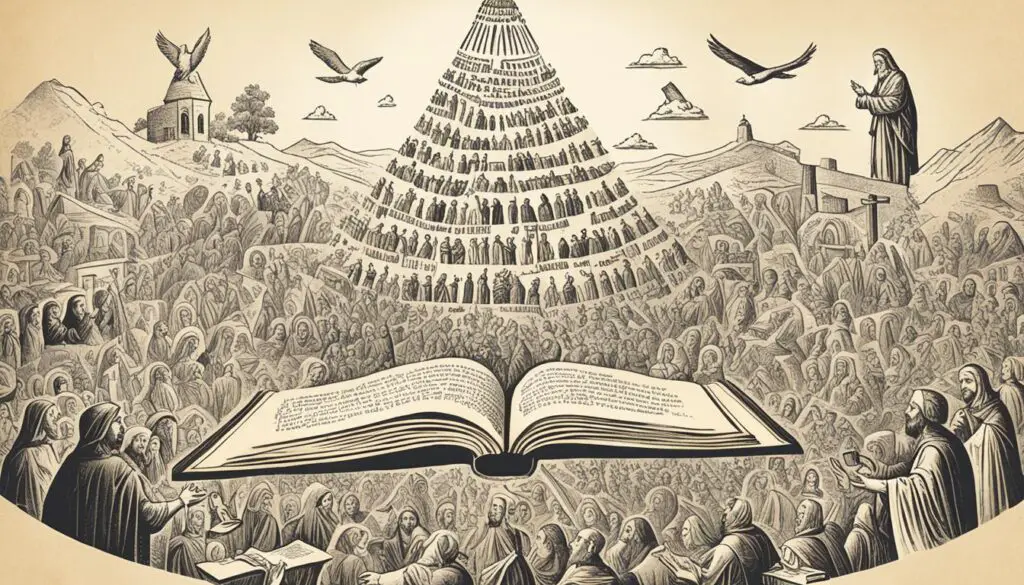Ethnography is an important tool for understanding social life and how people interact with theology. It helps us learn about the mix of culture, religion, and society. In “Ethnography as Christian Theology and Ethics,” authors explore using these methods in Christian study. They show how it helps understand complex topics.
The book also discusses seven case studies. These focus on using ethnography to study Christian beliefs in different cultures. This approach helps scholars and theologians see the Bible in new ways. They get a clearer picture of the cultural settings the Bible talks about.

Key Takeaways:
- Ethnography helps us see how culture, religion, and society meet.
- “Ethnography as Christian Theology and Ethics” looks at using these methods in Christian study.
- The book presents case studies that show how ethnography aids in understanding the Bible across cultures.
- This method helps scholars and theologians understand the Bible in its cultural context.
The Turn to Culture in Theology
The turn to culture in theology has changed our view of faith’s connection to our cultural settings. This shift started in the mid-1900s, inspired by social theory and cultural studies. It let theologians explore modern church life more deeply.
Christianity’s unique aspects and its link to culture have led scholars to study how culture affects our religious beliefs. This approach sees faith and religious life as not separate from society. It shows we live our faith within cultural contexts. Today, looking at people’s real lives and the culture they belong to is key in theological thinking.
“Theology needs cultural translation to be meaningful to people in diverse contexts.” -Dr. Elizabeth Conde-Frazier
Theology now speaks to everyday Christians more directly. It recognizes how personal and culture mix in faith. This change makes theology more open and flexible. Now it meets the needs of a wide range of cultural situations.
By focusing on culture, theology has become more capable in our complex world. It sees how culture and religious groups influence each other. By studying cultures, it improves our grasp of faith matters in different settings.

Importance of Cultural Situations in Theological Thinking
Knowing the culture where Christianity grows is crucial for theologians today. It helps us see the many ways people express their faith. This leads to a broader understanding of church life.
| Cultural Situations | Impact on Theological Thinking |
|---|---|
| Geographical location | Affects religious practices, rituals, and interpretations of theological concepts. |
| Historical context | Influences theological developments, doctrines, and interpretations of scripture. |
| Social dynamics | Shape relationships within the church, community engagement, and ethical considerations. |
| Language and culture | Influence the expression of faith, the development of liturgy, and theological terminology. |
By adopting a cultural perspective, theology becomes more diverse in its ideas. This mix of cultural insight and theological study deepens our faith’s meaning. It makes our view of the church more welcoming and informed.
The Turn to Practice in Theology
The turn to practice in theology moves away from just beliefs. It now looks at how people actually live their faith. It values real experience over abstract ideas. This new view knows that faith is shown through what people do and how they live.
Practical theology looks closely at the link between what people believe and how they act. It says that faith is more than thinking about it. It’s woven into everyday life. This kind of theology sees how actions reflect and shape faith.
“Practical theology emphasizes the importance of religious and social practices in understanding faith and action.”
Through practical theology, people better connect theory with what happens day-to-day. This helps understand how religious beliefs meet real life. It guides theologians in tackling issues in the modern church. And it speaks to what people feel and experience.

Practical Theology in Action: Examples
Practical theology is seen in many parts of religious life. Here are some examples:
- *1. Christian Hospitality and Welcoming Spaces*: Inclusive places and groups welcome everyone. They show the values of love and compassion through these actions.
- *2. Social Justice Advocacy*: Practical theology helps drive social change. It uses faith to fight poverty, inequality, and unfair systems.
- *3. Rituals and Worship*: The way people pray and share in worship is key in practical theology. It’s a chance to grow spiritually and feel connected to the divine with others.
By focusing on the real actions of faith, theologians can understand belief and behavior better. Practical theology looks at the full life of believers. It prompts people to think deeply about their beliefs and how they shape their lives.
Examples of Practical Theology in Action
| Ministry/Practice | Description |
|---|---|
| Christian Hospitality and Welcoming Spaces | Inclusive churches and organizations actively practice hospitality, creating welcoming spaces for diverse individuals and communities. Through this practice, they embody the values of acceptance, love, and compassion. |
| Social Justice Advocacy | Practical theology informs and guides social justice initiatives within religious communities. Activists and religious leaders often draw upon theological insights to address issues such as poverty, inequality, and systemic injustice. |
| Rituals and Worship | Religious rituals and worship practices hold immense significance in practical theology. These practices provide opportunities for communal reflection, spiritual growth, and connection with the divine. |
Conclusion
The use of ethnographic research methods with biblical topics lets us look closer at ancient societies and customs. It connects scholarly theology with how people in the church actually live their faith. This link helps theologians understand faith’s real-life impact and explore the cultures within religious groups.
Ethnographic research shows theologians how theology and culture mix. It helps them better grasp the deep meanings of old biblical texts. They get to see the real beliefs and practices of earlier communities. This way, theologians start to truly comprehend the Bible’s lessons and their connection to different people’s everyday lives.
Also, this way of studying is great for figuring out if theology matters today. By diving into religious communities, theologians witness real faith in action. They learn about the challenges and dreams that influence believers today. This immersive method makes theology more connected with real faith, sparking impactful thought.
To sum up, using ethnographic research methods with biblical topics makes theological studies more real. It joins the dots between theory and how believers practice their faith. This approach gives theologians a richer view of old cultures and current religious groups. It makes theological discussions more complete, focusing on real situations and diverse communities.
FAQ
What is ethnographic research?
Ethnographic research means studying people and their cultures closely. This is done by watching and talking with them. The goal is to really get their social and cultural world.
How are ethnographic research methods used in biblical contexts?
In the Bible, these methods help us understand ancient cultures better. They show how people lived back then. This helps connect study with how we understand churches today.
What is the turn to culture in theology?
The shift happened in the 20th century. It got its energy from social and cultural studies. This turn looks at how culture affects faith and the church. It explores Christianity’s unique aspects and the bond between belief and culture.
What is the turn to practice in theology?
“Practice” here means religious and social actions. The new focus understands faith through these actions. It moves away from just studying beliefs. This approach highlights how people practice faith in their daily lives.
How does ethnography enhance theological understanding?
Ethnography links theory with real-life practices. This lets theologians study faith up close. By examining communities’ cultures, they get deeper into what theology means. It connects study with how people truly live their faith.








